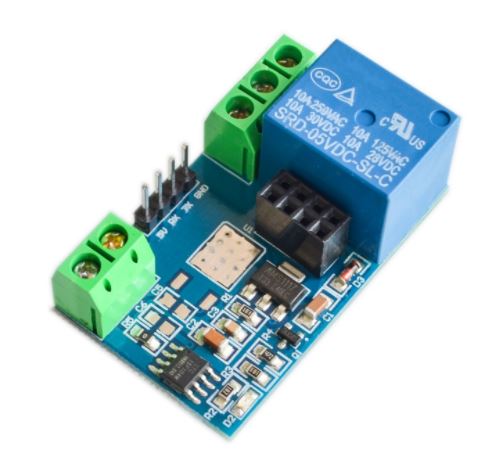Relais WIFI & ESP8266 version serveur
L'idée est de créer une page Web sur l'ESP8266 avec les informations d'un relais allumé ou eteind. Nous utilisons le module relais WIFI 5V & un ESP8266 version ESP-01.
Pour la programmation de l'ESP8266, il faut un dongle USB comme celui-ci. Prenez soin d'enlever l'ESP et le brancher sur le dongle USB cf page ICI.
L'ESP8266 est un module wifi qui possède une mémoire interne et un microcontrôleur il sera utilisé en fonction serveur.
Des précautions sont à prendre avant d'utiliser ce module.
D'abord le tester vous pouvez avoir les éléments ICI.
La liste des commandes est ICI.
Puis le flasher pour y injecter le scripte. Pour le flasher vous aurez tout ce qu'il faut ICI.
 |
 |
 |
 |
 |
Le scripte ci-dessous est a injecter dans l'ESP8266 à partir du logiciel arduino.
La configuration de cet ESP-01 doit être ainsi.
L'Arduino doit être alimenté en 3,3 volts minimum.
Le scripte est à télécharger en version serveur ICI
/*--------------------------------------------------
HTTP 1.1 Webserver for ESP8266
for ESP8266 adapted Arduino IDE
http://www.esp8266.com/viewtopic.php?p=65572
--------------------------------------------------*/
#include
const char* ssid = "FREE";
const char* password = "WIFI";
int ledState = false;
unsigned long ulReqcount;
unsigned long ulReconncount;
byte relON[] = {0xA0, 0x01, 0x01, 0xA2}; //Hex command to send to serial for open relay
byte relOFF[] = {0xA0, 0x01, 0x00, 0xA1}; //Hex command to send to serial for close relay
// Create an instance of the server on Port 80
WiFiServer server(80);
void setup()
{
// setup globals
ulReqcount=0;
ulReconncount=0;
// start serial
Serial.begin(9600);
delay(1);
// inital connect
WiFi.mode(WIFI_STA);
WiFiStart();
}
void WiFiStart()
{
ulReconncount++;
// Connect to WiFi network
Serial.println();
Serial.println();
Serial.print("Connecting to ");
Serial.println(ssid);
WiFi.begin(ssid, password);
while (WiFi.status() != WL_CONNECTED) {
delay(500);
Serial.print(".");
}
Serial.println("");
Serial.println("WiFi connected");
// Start the server
server.begin();
Serial.println("Server started");
// Print the IP address
Serial.println(WiFi.localIP());
}
void loop()
{
// check if WLAN is connected
if (WiFi.status() != WL_CONNECTED)
{
WiFiStart();
}
// Check if a client has connected
WiFiClient client = server.available();
if (!client)
{
return;
}
// Wait until the client sends some data
Serial.println("new client");
unsigned long ultimeout = millis()+250;
while(!client.available() && (millis()ultimeout)
{
Serial.println("client connection time-out!");
return;
}
// Read the first line of the request
String sRequest = client.readStringUntil('\r');
//Serial.println(sRequest);
client.flush();
// stop client, if request is empty
if(sRequest=="")
{
Serial.println("empty request! - stopping client");
client.stop();
return;
}
// get path; end of path is either space or ?
// Syntax is e.g. GET /?pin=MOTOR1STOP HTTP/1.1
String sPath="",sParam="", sCmd="";
String sGetstart="GET ";
int iStart,iEndSpace,iEndQuest;
iStart = sRequest.indexOf(sGetstart);
if (iStart>=0)
{
iStart+=+sGetstart.length();
iEndSpace = sRequest.indexOf(" ",iStart);
iEndQuest = sRequest.indexOf("?",iStart);
// are there parameters?
if(iEndSpace>0)
{
if(iEndQuest>0)
{
// there are parameters
sPath = sRequest.substring(iStart,iEndQuest);
sParam = sRequest.substring(iEndQuest,iEndSpace);
}
else
{
// NO parameters
sPath = sRequest.substring(iStart,iEndSpace);
}
}
}
///////////////////////////////////////////////////////////////////////////////
// output parameters to serial, you may connect e.g. an Arduino and react on it
///////////////////////////////////////////////////////////////////////////////
if(sParam.length()>0)
{
int iEqu=sParam.indexOf("=");
if(iEqu>=0)
{
sCmd = sParam.substring(iEqu+1,sParam.length());
Serial.println(sCmd);
}
}
///////////////////////////
// format the html response
///////////////////////////
String sResponse,sHeader;
////////////////////////////
// 404 for non-matching path
////////////////////////////
if(sPath!="/")
{
sResponse="404 Not Found Not Found
The requested URL was not found on this server.
";
sHeader = "HTTP/1.1 404 Not found\r\n";
sHeader += "Content-Length: ";
sHeader += sResponse.length();
sHeader += "\r\n";
sHeader += "Content-Type: text/html\r\n";
sHeader += "Connection: close\r\n";
sHeader += "\r\n";
}
///////////////////////
// format the html page
///////////////////////
else
{
ulReqcount++;
sResponse = "Demo pour ESP8266 version ESP-01 ";
sResponse += "";
sResponse += "";
sResponse += "Demo pour ESP8266 version ESP-01
";
sResponse += "Allumez en cliquant sur le bouton.
";
sResponse += "";
sResponse += "";
//////////////////////
// react on parameters
//////////////////////
if (sCmd.length()>0)
{
// write received command to html page
sResponse += "Kommando:" + sCmd + "
";
// switch GPIO
if(sCmd.indexOf("FUNCTION1ON")>=0)
{
Serial.write(relON, sizeof(relON)); // turns the relay ON
ledState = false;
}
else if(sCmd.indexOf("FUNCTION1OFF")>=0)
{
Serial.write(relOFF, sizeof(relOFF)); // turns the relay OFF
ledState = true;
}
}
sResponse += "";
sResponse += "
Aufrufzähler=";
sResponse += ulReqcount;
sResponse += " - Verbindungszähler=";
sResponse += ulReconncount;
sResponse += "
";
sResponse += "";
sHeader = "HTTP/1.1 200 OK\r\n";
sHeader += "Content-Length: ";
sHeader += sResponse.length();
sHeader += "\r\n";
sHeader += "Content-Type: text/html\r\n";
sHeader += "Connection: close\r\n";
sHeader += "\r\n";
}
// Send the response to the client
client.print(sHeader);
client.print(sResponse);
// and stop the client
client.stop();
Serial.println("Client disonnected");
}
/*
test a faire
#define RX_PIN 3 // GPIO3
#define TX_PIN 1 // GPIO1
void setup() {
// dont Serial.begin(74880)!!!!!!!!!!!!!!!!!!!
pinMode(RX_PIN, INPUT);
pinMode(TX_PIN, INPUT);
}
*/
Not Found
The requested URL was not found on this server.
"; sHeader = "HTTP/1.1 404 Not found\r\n"; sHeader += "Content-Length: "; sHeader += sResponse.length(); sHeader += "\r\n"; sHeader += "Content-Type: text/html\r\n"; sHeader += "Connection: close\r\n"; sHeader += "\r\n"; } /////////////////////// // format the html page /////////////////////// else { ulReqcount++; sResponse = "Demo pour ESP8266 version ESP-01
"; sResponse += "Allumez en cliquant sur le bouton."; sResponse += ""; sResponse += ""; ////////////////////// // react on parameters ////////////////////// if (sCmd.length()>0) { // write received command to html page sResponse += "Kommando:" + sCmd + "
"; // switch GPIO if(sCmd.indexOf("FUNCTION1ON")>=0) { Serial.write(relON, sizeof(relON)); // turns the relay ON ledState = false; } else if(sCmd.indexOf("FUNCTION1OFF")>=0) { Serial.write(relOFF, sizeof(relOFF)); // turns the relay OFF ledState = true; } } sResponse += ""; sResponse += "
Aufrufzähler="; sResponse += ulReqcount; sResponse += " - Verbindungszähler="; sResponse += ulReconncount; sResponse += "
"; sResponse += ""; sHeader = "HTTP/1.1 200 OK\r\n"; sHeader += "Content-Length: "; sHeader += sResponse.length(); sHeader += "\r\n"; sHeader += "Content-Type: text/html\r\n"; sHeader += "Connection: close\r\n"; sHeader += "\r\n"; } // Send the response to the client client.print(sHeader); client.print(sResponse); // and stop the client client.stop(); Serial.println("Client disonnected"); } /* test a faire #define RX_PIN 3 // GPIO3 #define TX_PIN 1 // GPIO1 void setup() { // dont Serial.begin(74880)!!!!!!!!!!!!!!!!!!! pinMode(RX_PIN, INPUT); pinMode(TX_PIN, INPUT); } */